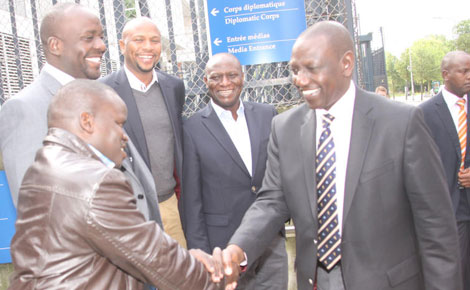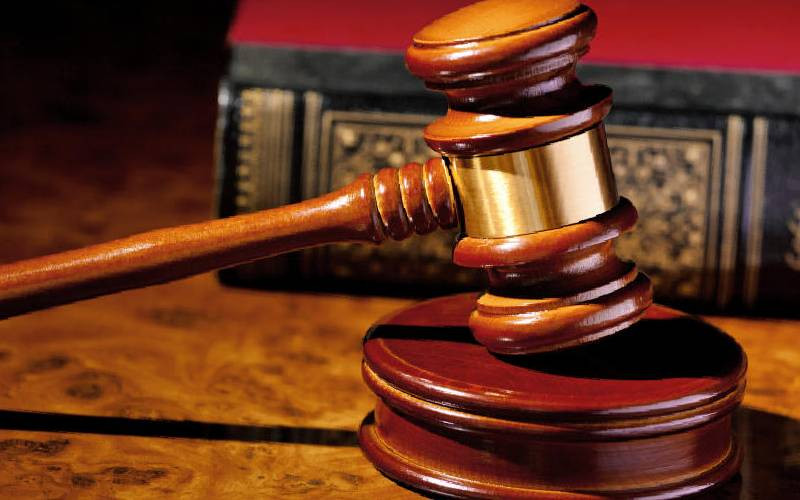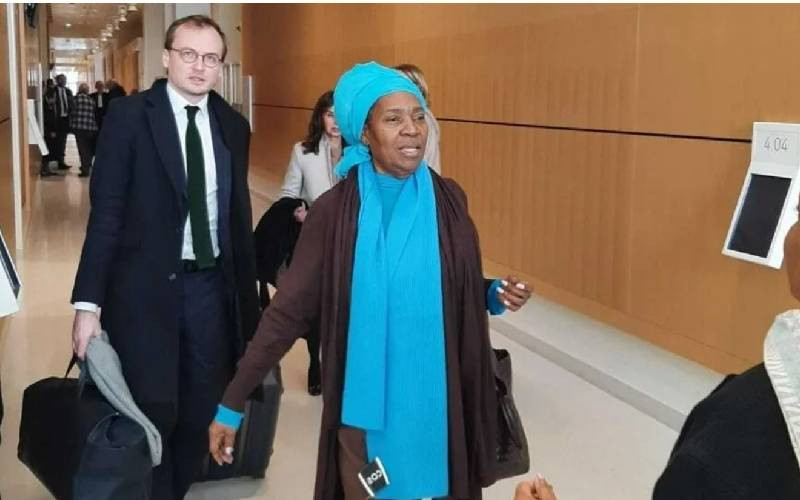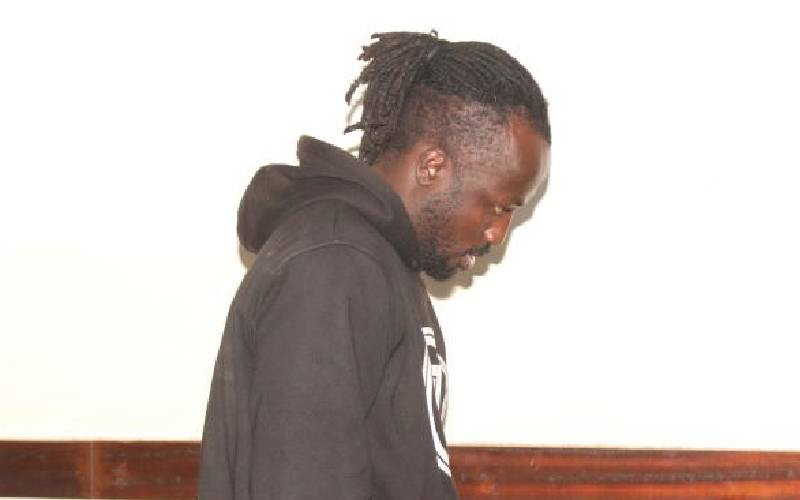 |
|
Deputy President William Ruto is received by journalist Joshua Sang when he arrived at the ICC on Friday for the hearing of his case going on at the Hague, Netherlands . On the DP’s immediate right is Senator Charles Keter of Kericho. |
The ICC trial of Deputy President William Ruto and journalist Joshua Sang resumed yesterday with the judicial inquiry into the 2007/2008 Post-Election Violence (PEV) becoming the subject of the proceedings.
The Prosecution produced a report prepared by the Commission of Inquiry into the PEV that was headed by Justice Philip Waki, and also called one of the three commissioners, Gavin McFadyen, to testify on the report and the inquiry.
But Mr Ruto's defence team took issue with the manner in which the Prosecution was leading evidence on the inquiry report. Lawyer Karim Khan objected to having the witness questioned on how the commission concluded that the violence in parts of the Rift Valley was planned and not spontaneous.
He raised the objection as the Prosecution Counsel Anton Stenberg took the witness through parts of evidence in the report, adduced by witnesses who appeared before the commission in 2008.
"Are we confronting the charges facing the accused or are we going to inquire into the merits or otherwise of the Waki Commission? How long will we start going through all those witnesses?" Khan posed.
The lawyer said it was irrelevant whether the Waki Commission had concluded the chaos was planned or spontaneous.
Witness testimonies
Khan added that the Prosecution had an obligation to call the witnesses who appeared before the Waki Commission for the chamber to hear from them, and not using the former commissioner to adduce hearsay evidence.
"They abdicated their duty to simply accepting the Waki boxes, and they (Prosecutor) are now asking your honours to do the same thing," he said, adding that the Prosecution had repeatedly stated they would not rely on the Waki report.
But the court overruled him saying there was nothing wrong in hearing how the Waki Commission made the conclusion. "We have our own mind to make up our finding. There is nothing wrong or inconsistent in knowing how others came to that conclusion," said presiding Judge Eboe Osuji.
Mr McFadyen, a former New Zealand assistant police commissioner gave details of how the commission was established and what its mandate was.
He was led through evidence on portions of the report, touching on violence in the Rift Valley, the funding of the PEV, media contribution and also the consequences of the violence.
The witness said the commission decided to conduct most of its activities and proceedings in public. He said the inquiry entailed hearing of oral evidence from witnesses under oath and recording their statements.
Oath of office
McFadyen said the impartiality of the commissioners and the staff was fundamental. Justice Waki administered oath to all the commission staff.
Stay informed. Subscribe to our newsletter
The commission had two foreign investigators from New Zealand led by Bob Grinstead.
The witness, who testified in the open, said the commission had sourced some material from Government agencies such as the police and the National Intelligence Service, the media, among other organisations with expertise, especially on gender-based violence.
He said the commission's report did not mention individuals who were directly implicated in the violence but recommended that some persons be investigated by other entities.
 The Standard Group Plc is a
multi-media organization with investments in media platforms spanning newspaper
print operations, television, radio broadcasting, digital and online services. The
Standard Group is recognized as a leading multi-media house in Kenya with a key
influence in matters of national and international interest.
The Standard Group Plc is a
multi-media organization with investments in media platforms spanning newspaper
print operations, television, radio broadcasting, digital and online services. The
Standard Group is recognized as a leading multi-media house in Kenya with a key
influence in matters of national and international interest.
 The Standard Group Plc is a
multi-media organization with investments in media platforms spanning newspaper
print operations, television, radio broadcasting, digital and online services. The
Standard Group is recognized as a leading multi-media house in Kenya with a key
influence in matters of national and international interest.
The Standard Group Plc is a
multi-media organization with investments in media platforms spanning newspaper
print operations, television, radio broadcasting, digital and online services. The
Standard Group is recognized as a leading multi-media house in Kenya with a key
influence in matters of national and international interest.









